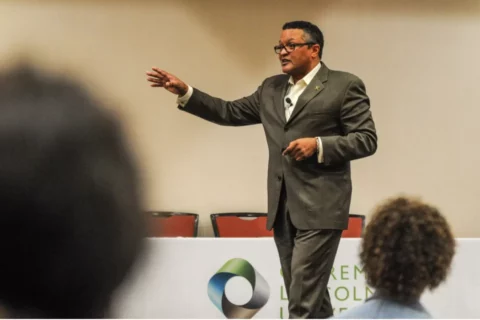The District of Columbia’s 911 call center reportedly took 14 minutes to dispatch Fire and EMS crews to help more than 100 passengers stranded on an uncoupled Metro train last Friday.
The Red Line train was traveling from Union Station to the NoMa-Gallaudet U station on Oct. 9 when two cars separated from each other at 12:21 p.m., Metro Transit Police said. Nobody was injured.
The District’s Office of Unified Communications, which operates the 911 center, was notified at 12:22 p.m. after a call from the transit agency’s Rail Operations Control Center, according to a new report from Dave Statter — a former reporter who is now a safety advocate — on his Statter911 blog.
Yet D.C.’s 911 center didn’t dispatch the call until 12:36 p.m., according to Statter, citing radio traffic logged by OpenMHz.com.
“Almost a 14-minute delay, and there’s no explanation as to why,” Statter said.
All eight cars remained on the tracks, but the 103 passengers on board were stuck for about two hours before emergency crews escorted them by foot from the disabled train back to Union Station.
“It’s 911’s job to verify the address and accurately and promptly dispatch Fire and EMS to any incident,” said Statter.
“Taking 14 minutes to verify something from an agency they deal with every day doesn’t make any sense. We don’t know the answers of what they were doing during those almost 14 minutes.”
Statter said the National Fire Protection Association standard for 911 call centers is that 90% of “Priority 1” calls are dispatched within 60 seconds.
The District’s 911 center has had previous problems dealing with emergencies on Metro.
“You may recall the deadly Metro fire at L’Enfant Plaza a little more than five years ago,” said Statter. “After that incident, the National Transportation Safety Board recommended an audit for OUC’s 911 center because of the delay it caused in sending help to that stranded Metro train. That audit was never done.”
The Office of the DC Auditor last month said it would be auditing OUC after “recent events call into question the effectiveness of OUC’s 911 Operations Division.”
The auditor’s office listed the failure of OUC to conduct the audit recommended by the NTSB as one of the reasons it was undertaking the investigation.
In a joint statement, FEMS and OUC said, “Prior to dispatching the field providers, both the DC Fire and EMS (FEMS) fire liaison officer (FLO) located within the OUC contacted Metro’s Rail Operations Control Center and battalion fire chief of special operations sought to gather more pertinent information in order to coordinate an appropriate response plan.”
“Once determined, the FLO relayed the information to the OUC who then dispatched accordingly,” the statement said. “While the response times did not meet expectations, OUC, FEMS, and WMATA will be reviewing this case to streamline decision making processes in future situations where there were no injuries on a Metro train.”








